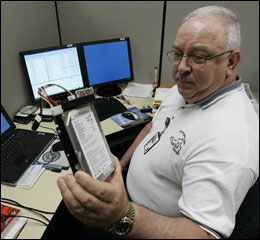The Associated Press
RICHMOND, Va. — The Virginia State Police on Tuesday announced plans for a new cyber crimes investigation center to keep up with the rapidly growing demand for digital forensic evidence analysis.
 |
The Virginia Digital Forensics Laboratory is the result of a collaboration launched earlier this year between state police, Virginia Commonwealth University and the National White Collar Crime Center.
As technology becomes more advanced, so, too, do criminals. Embezzlers often leave computer trails of their activities, some gangs have their own Web sites and most suspects have cell phones.
“The bad guys have all of these gizmos and tools and toys that we have,” said Lt. Col. Robert Northern, deputy superintendent of the state police. “Thus the digital age creates all kinds of new challenges for law enforcement and has literally changed the way that we do business.”
With an increasing reliance on digital forensics comes an increasing need for skilled examiners who can sift through the evidence -- and adequate space to analyze it.
The state police’s current digital forensics lab, the Computer Evidence Recovery Unit, is a cramped 1,400-square-foot space with room for just nine computer forensic examiners. Inside, workers hunker down in small cubicles, busily tapping away at keyboards as data flashes across multiple monitors.
The new lab will ideally be about 10 times larger and have space for 25 examiners, said state police Sgt. Robert Keeton, director of the current lab. Training will also be a big part of the new facility, which will include classroom space and will host VCU interns.
Officials are still working to secure funding for the project, and are waiting on final approval from the U.S. Department of Justice, said police spokeswoman Corinne Geller. There is not yet a projected opening date for the lab, which will be located at an undetermined site in Richmond.
The Computer Evidence Recovery Unit currently handles about 100 cases a year for federal, state and local authorities. Examiners at the lab have looked at the equivalent of 7 million paper documents this year alone, Keeton said.
Among the lab’s more notable cases was an embezzlement scandal involving a Louisa County priest, a serial rape investigation in Charlottesville and the Virginia Tech shootings.
In each of those cases, digital forensic evidence played an important role in the investigation, Keeton said. After the April 16 shootings at Virginia Tech, the lab examined students’ cell phones and analyzed digital material gunman Seung-Hui Cho recorded before embarking on his killing spree. And evidence obtained from computers helped secure the case against Rodney Rodis, a retired Roman Catholic priest who stole hundreds of thousands of dollars from two Virginia parishes.
“I would consider it as important as DNA,” Keeton said of digital forensic evidence. “More and more what we view as traditional crimes are becoming more a part of digital forensics.”

